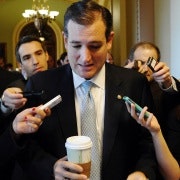Obama's gridlock is for keeps
Barack Obama has not yet clocked up 100 days – he hits that milestone on Wednesday. Yet there is already an air of resignation about how the next four years are likely to play out. A large share of it comes from the realisation that the Republican party is not for turning after all – at least, not on anything other than immigration. Presidential elections come and go. Gridlock is for keeps. But some of the gloom also attaches to Obama. Ask 10 Washington Democrats to summarise his second-term strategy and you will get 11 theories.
After last year’s election, this strategic vacuum should come as little surprise. The brilliance of the Obama campaign’s 2012 on-the-ground strategy and the disorganisation of Mitt Romney’s distracted people from the fact that Obama had remarkably little to say about what he would do if he won. Democratic spirits were boosted at the start of this year with the deal to avert the fiscal cliff, in which Obama finally got Republicans to agree to a tax rise. It may have been modest. The top rate went from 35 per cent to 39.6 per cent and the threshold was doubled to $US400,000. But people thought the dam had broken. If Republican purists could permit one transgression, more would surely follow.
That now looks to have been a colossal misreading of the Republican mood and of the fact that the tactical advantage was swinging back to them. They still have it. In exchange for agreeing to the January 2 tax increase, Republicans held John Boehner, the speaker of the House of Representatives, to an implicit bargain: ‘Never again,’ in the words of one lawmaker. Moreover, revenge was written into the fiscal cliff deal. Democrats blithely assumed that the March 1 trigger of $US1200 billion in across-the-board spending cuts would be averted at the last minute. Sure enough, sequestration went ahead. Far from being unimaginable, as sequestration was intended to be, it is already normal.
Since March 1, Republicans have only sharpened their tactical edge. On Friday Obama signed a law giving the Federal Aviation Administration discretion over how it makes its sequestration cuts. The hurriedly drafted bill was passed just five days after the start of nationwide flight delays resulting from the FAA’s ‘rolling furloughs’ of air traffic staff. It was the sole exception to sequestration. As far as Washington is concerned, air travellers are in a hallowed category. It is hard to imagine Bill Clinton giving up so easily. “This victory is in large part a result of our standing together under the banner of #Obamaflightdelays,” trumpeted Eric Cantor, Republican House leader, in a memo on Friday.
In contrast, it is now 60 days since the start of cuts for veterans’ care, meals on wheels, school scholarships and pretty much every other domestic program. None of these is likely to be rescinded by Congress. Nor are other government agencies likely to get the FAA’s flexibility. Many have rightly observed that Britain’s economy is suffering from premature austerity. But as a share of the economy, the US fiscal contraction in 2013 is considerably larger. And the cuts are blind (by design) as well as dumb. For all his sensible budget proposals, Obama is not winning that war of attrition.
Nor is it obvious what else is on the menu. Many took note of Obama’s promise to tackle global warming in his inaugural address. That was the last anyone heard of it. Given that it went unmentioned in the election, this should be no surprise. The same cannot be said for guns. Having promised in the wake of the Newtown schoolchildren’s massacre in December to use all his presidential muscle to pass gun control, Obama handed the task to Joe Biden, the vice-president. Earlier this month, a resigned Obama said Congress at least owed the Newtown victims a vote (not a law). Only after it was defeated did his anger resurface.
Which leaves immigration. Here Obama has a real chance of helping to father a historic reform and remove some of Washington’s tarnish. Should an overhaul be enacted, which is questionable given House plans to break the Senate’s draft into separate bills, it would be for one leading reason – Republicans are terrified of alienating the Hispanic vote. Pulling off America’s first overhaul in almost 30 years would still be a big deal on both sides. But it would be for unique reasons. Anyone doubting that should note the unflagging Republican energy to abolish ‘Obamacare’.
The past offers no real guide for Obama. In their second terms, US presidents typically devote much of their time to defending first-term achievements, and falling in love with foreign policy. Even as Syria gets more volatile and the Taliban embarked on its 'spring offensive' this weekend, Obama hopes to keep the rest of the world at arm’s length. Most of his ambitions are domestic. Some of the déjà vu in Washington comes from knowing that next year’s Congressional elections are in a sense already under way.
In Obama’s opening flurry in 2009, he worked with a Democratic Congress to get a lot done – more than in any first 100 days since Franklin Roosevelt. With a Republican House this time, the contrast is plain to see. This is the big political lesson of Obama’s presidency so far.
The fear is that it will remain so until he leaves office.
The writer is principal at www.ftchinaconfidential.com.
Copyright The Financial Times 2013.
















